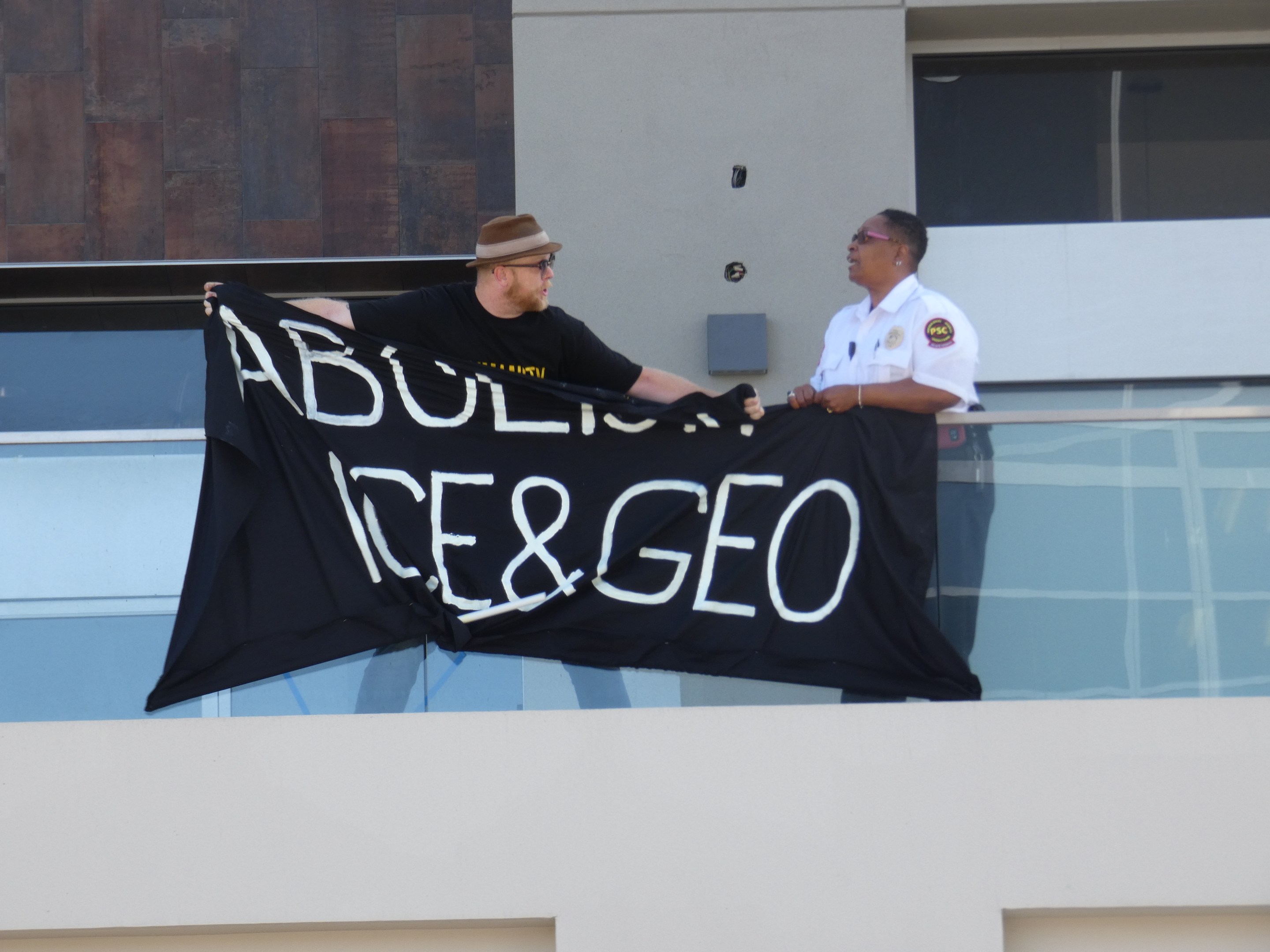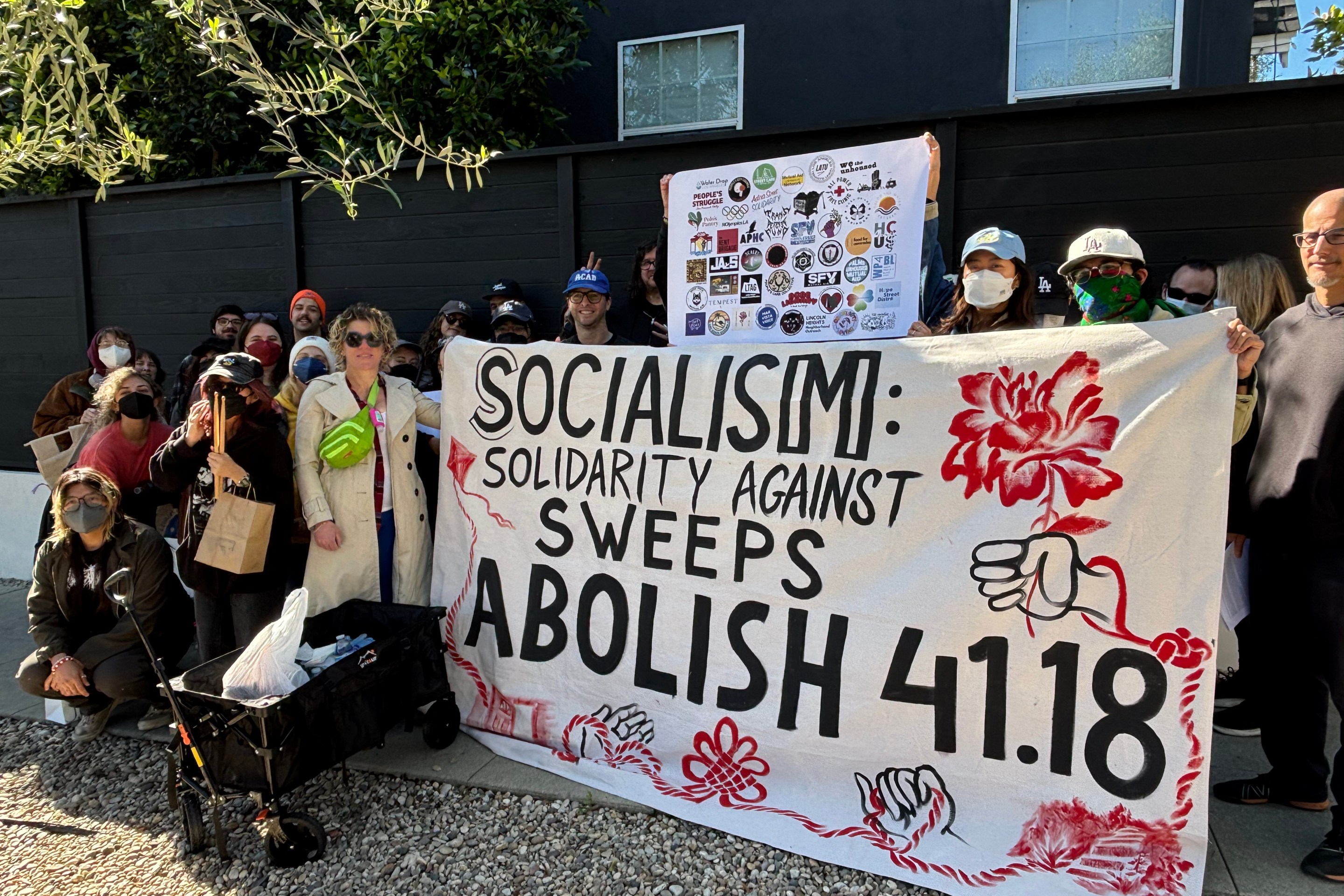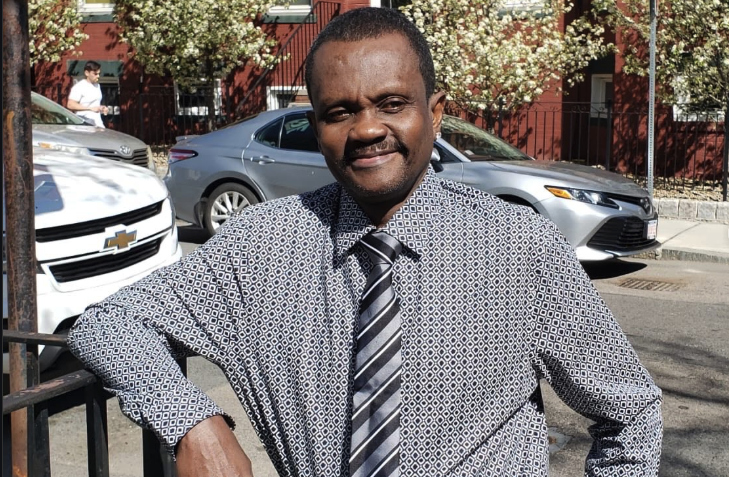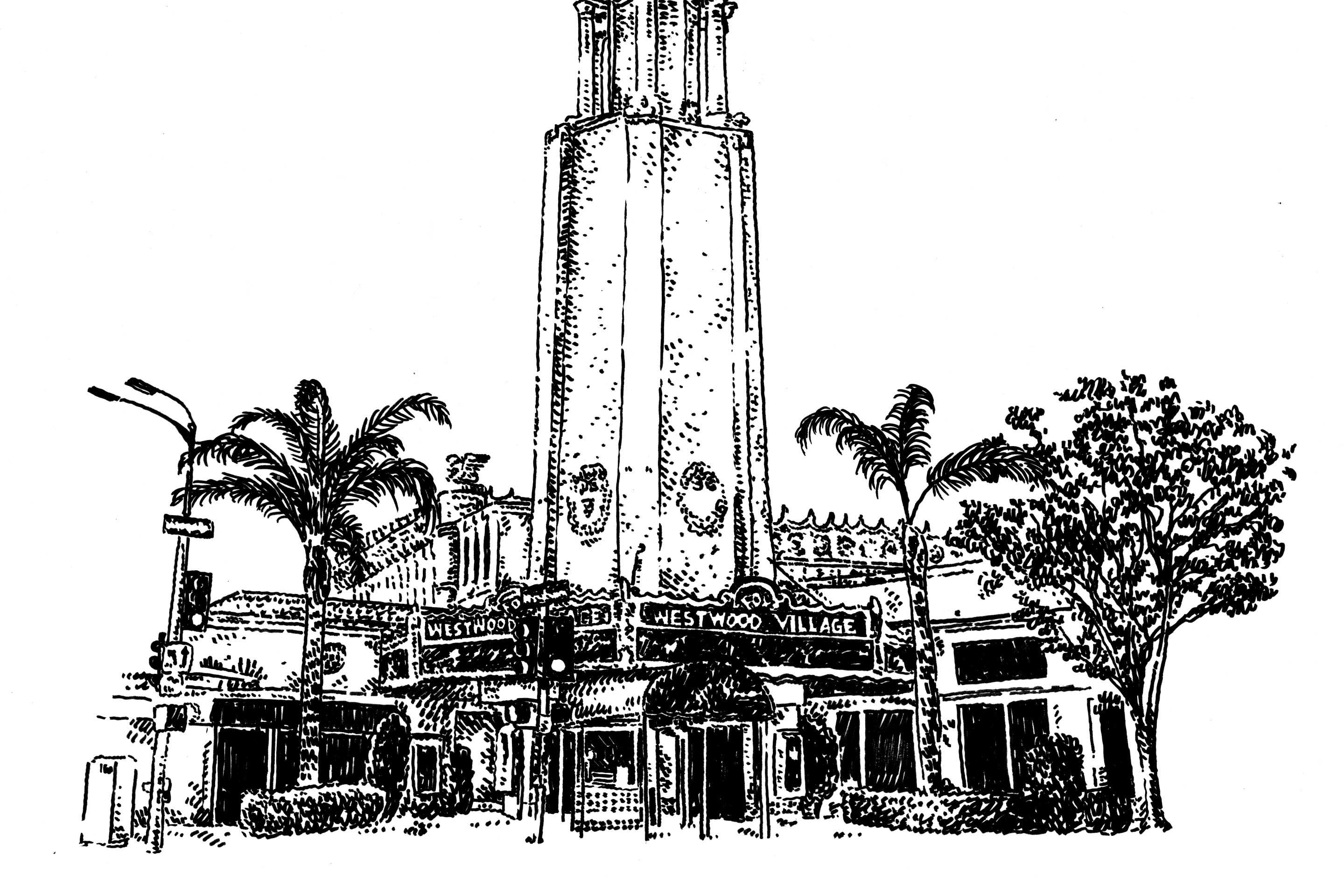[dropcap size=big]D[/dropcap]ozens of demonstrators on Friday took over a sidewalk in front of a sleek Westside office complex that houses the offices of the largest private prison company in the United States, another local action against the government-industry ties enabling the inhumane treatment of migrants who arrive at the U.S.-Mexico border.
The federal government has awarded the GEO Group about $4 billion over ten years to run more than 100 prisons and ICE detention centers across the country, totaling more than 75,000 beds.
On Friday, its regional office at 6100 Center Drive, part of the Howard Hughes Center, saw a boisterous morning rally and traffic blockade organized by the Humanity First Coalition, a newly formed alliance of activist groups.
“The GEO Group is a private prison system. They profit off of locking people up,” said one demonstrator, Timothy Bluitt. “It’s a win-win situation for the corporations and it’s a loss for the everyday taxpayer because the taxpayers are paying for it.”
Organizers hoped to draw attention to corporations profiting from America’s prison and immigration industrial complex “hiding in plain sight.” Many in attendance said they didn’t know a private prison company had a location in West L.A.
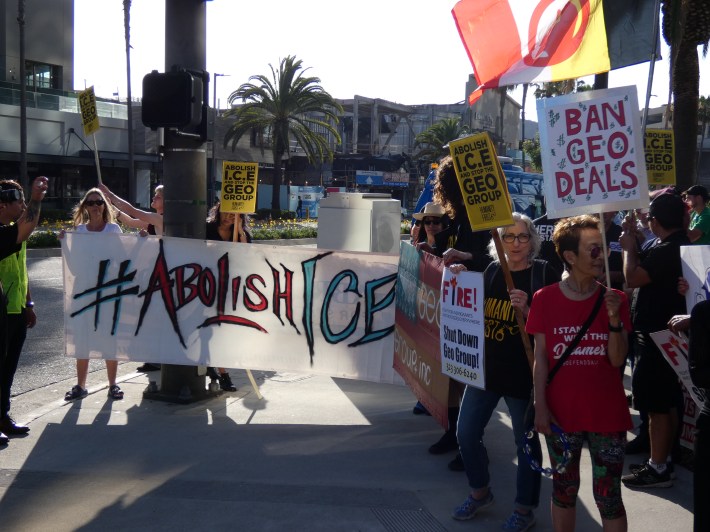
GEO Group provides transportation services, primarily for immigration detainees. According to its website, seven of the top ten facilities to which it brings people in custody are ICE facilities, spanning from Washington state to Colorado to San Diego.
The private prison industry was in freefall after a 2016 executive order to end federal contracts with such companies, but President Trump gave it – and GEO in particular – new life. GEO’s stock price, which had dropped by a third after the 2016 order, doubled in the months after Trump’s election. The company moved its annual conference to a Trump-owned golf course and gave hundreds of thousands of dollars to Republican PACs and Trump’s inauguration fund.
The result? About three quarters of a billion dollars in federal contracts for 2017.
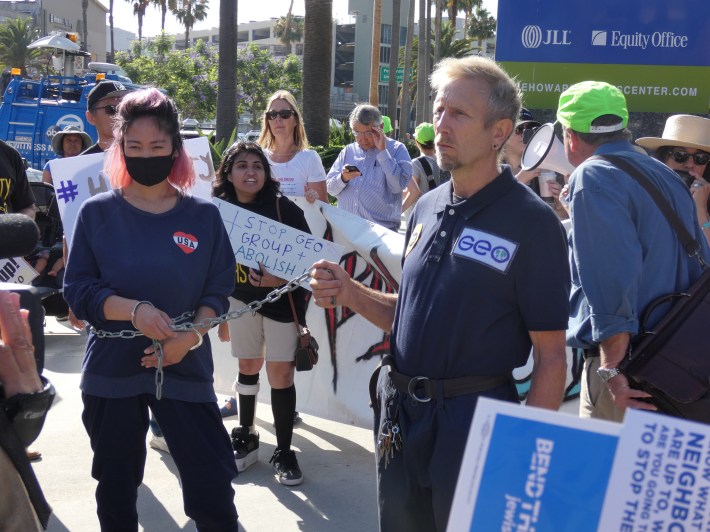
“They’re profiting huge, big time off of our communities,” said Alejandra Machuca, a member of the group Border Angels. “That’s something we’re not going to stand for, especially in our hometown.”
Operating an office just off the 405, near Westchester and Fox Hills, the GEO Group’s corporate presence sits in a building that bears the name of Pepperdine University. The location serves as headquarters for the school’s graduate programs in psychology, education, and business. The university could not be reached for comment.
“They’re leasing small offices right in our communities,” said Michelle Manos of California for Progress, who helped organize the protest. “They’re pushing their papers and they’re able to turn the wheels that have this horrifying fascist machine in motion.”
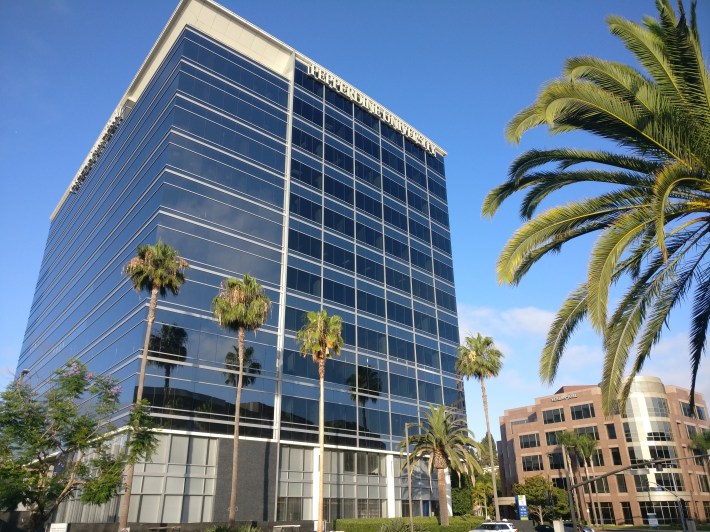
[dropcap size=big]A[/dropcap]long with a rally outside the office building and a brief traffic blockade, protesters parked cars in garage spaces they believed were reserved for GEO Group employees. An operations team for the complex was largely passive until a man – apparently an employee of an unaffiliated finance company – whose spot was obstructed began a confrontation with protesters in the parking garage.
“Ladies and gentleman, this moment brought to you by white fragility!” yelled Jeremy White, one of the demonstrators, during the argument.
As the man left, he bumped a couple protesters with his SUV but no one was injured. He did call the LAPD, however, who showed up with four squad cars and at least eight officers well after the confrontation was over.
“When a rich white businessman calls the cops for help, this is the f---ng response you get,” White told me.
Nobody was arrested or detained. The building operations team declined to comment.
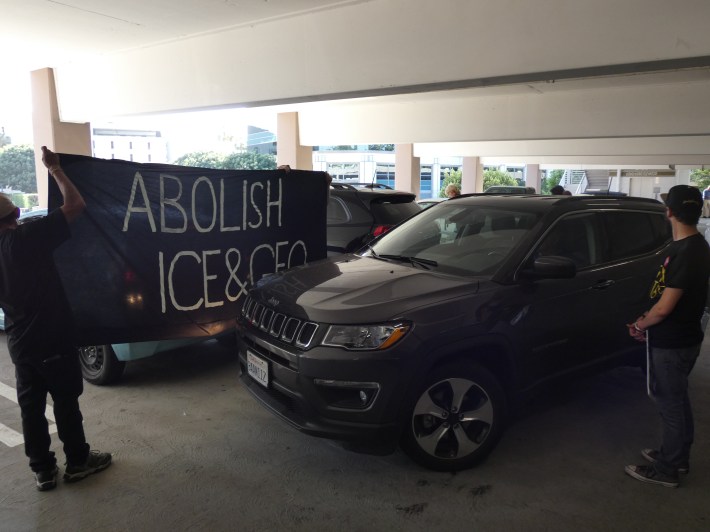
[dropcap size=big]F[/dropcap]riday’s demonstration also aimed at calling attention to another facet of US immigration policy: immigrant veterans who are subject to deportation despite having served in the U.S. military. Maria Guadalupe Cibrian is the wife of Hector Lopez, who she said was deported after having his green card revoked for a minor criminal offense.
“There’s hundreds of our U.S. military vets who are deported,” she said. “That is wrong. That is an unjust act … We love our country, but we don’t love what they do. This needs to change.”
Living in Tijuana, Lopez works to try to bring attention to the issue with the help of groups like Veterans for Peace and the Unified US Deported Veterans Resource Center. According to the advocacy group American Families United, nearly 12,000 military families are currently dealing with immigration- and deportation-related issues.
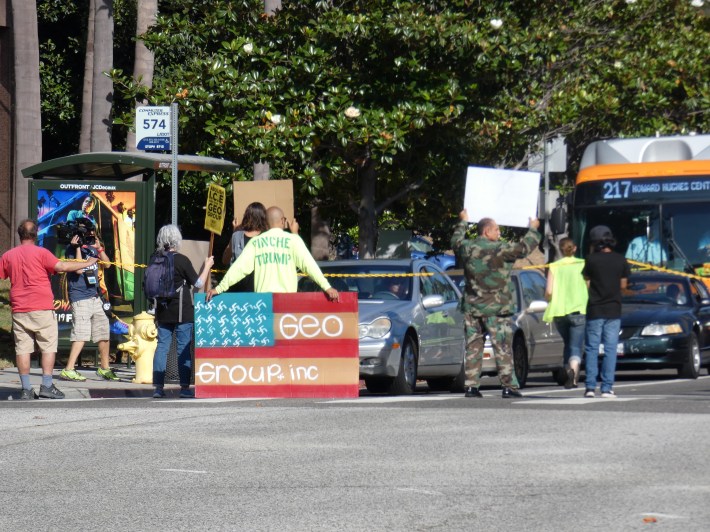
A veteran attending the demonstration, Carlos Marroquin, drew attention to the fact hundreds if not thousands of undocumented immigrants serve or have served in the armed forces.
“Immigrants have been used as a political game … We need to remind the public that immigrants have played a very important role, even in our military,” he said, invoking the name of Jose Gutierrez, an undocumented immigrant from Guatemala who was the first U.S. casualty of the 2003 Iraq invasion. “We need policies that are fair and just and humane.”
The GEO Group said it was planning to release a statement on the action, which was not available at the time of publication.
All photos by Warren Szewczyk.
RELATED: Photo Gallery: Los Angeles Stands Up For TPS, Immigrants Rights
